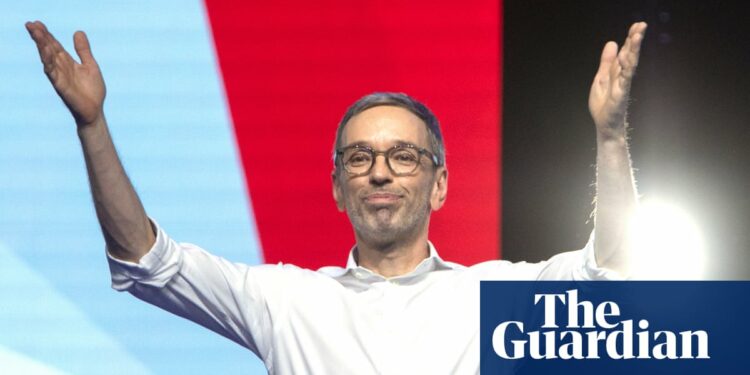One of Europe’s oldest far-right parties, the FPÖ was founded in 1956. Despite being initially headed by a former Nazi functionary and SS officer, it was a relatively moderate liberal party until the mid-1980s, when it veered radically right under the firebrand leader Jörg Haider.
The party has twice been the junior partner in short-lived coalition governments with the conservative Austrian People’s party (ÖVP), after finishing second in the parliamentary elections of 1999 with 27% of the vote and third in 2017 with 26% of the vote.
Both coalitions ended early. Bitter FPÖ infighting led to the collapse of the first in 2002, and the so-called Ibizagate scandal in 2019 forced the resignation of the party’s then leader, Heinz-Christian Strache, and torpedoed the second after 18 months in office.
What is its programme?
Now led by the controversial former interior minister Herbert Kickl, the FPÖ is nativist, anti-immigration, hostile to Islam and staunchly Eurosceptic. One of its MEPs, Harald Vilimsky, has described its electoral mission as “kicking the establishment in the butt”.
The FPÖ’s programme, “Fortress Austria, Fortress of Freedom”, plans to cut provision for irregular migrants and asylum seekers to a bare minimum, block family reunification for migrants already in Austria, and promote “remigration”, particularly for offenders.
It also wants to cut corporate tax and wage costs, and in foreign policy it is opposed to EU sanctions against Russia and further aid to Ukraine. The FPÖ has signed and renewed a “cooperation agreement” with Vladimir Putin’s United Russia party.
Herbert Kickl speaks at a campaign event in Graz. Photograph: Alex Halada/AFP/Getty Images Who else is running and what do the polls say?
Polling at between 27% and 29%, the FPÖ has been ahead since late 2022, finished first in May’s European elections, and leads the centre-right ÖVP (25-26%) of the outgoing chancellor, Karl Nehammer, by about three points.
In third place are the Social Democrats (SPÖ), the traditional centre-left party, on 20-21%, followed at some distance by the liberals of NEOS-New Austria on about 10% and the Greens (part of the outgoing government coalition) on about 7%.
Polls suggest two other parties could qualify for seats in the assembly: the Beer party, led by the lead singer of the punk band Turbobier who wants “politics depoliticised” (4%), and the Communist party (KPÖ), which has not had an MP since the 1950s but is on 3%.
What have been the election’s key issues?
The cost of living has been a major voter concern, with Austria’s headline inflation rate stuck for nearly two years above the average for the 27-member EU, growth consistently below it, and the far right blaming migration and the war in Ukraine.
Tougher immigration rules feature – to varying degrees – in the manifestos of all three main parties, while security has become an issue since Vienna police said last month they had foiled a plot to attack a Taylor Swift concert. Three suspects in the case are the teenage sons of immigrants.
Widespread flooding that killed five people in Austria this month has pushed the climate up the agenda (and slightly boosted the ÖVP). Austria still depends heavily on Russian gas and is under mounting pressure to reduce its consumption.
What kind of government could emerge?
His many critics say Kickl, 55, uses Nazi-era tropes (which he denies), is close to Moscow, will seriously upset relations with Brussels and is generally too toxic to work with – or at least to work under, which may prove a vital distinction.
Kickl and other FPÖ figures have been under investigation since April for allegedly using public funds while in government to take out media ads in exchange for favourable party coverage. The party has said the advertising was taken out for “proper reasons”.
The ÖVP’s Nehammer has ruled out joining a government headed by the FPÖ leader, saying Kickl is far more radical than his predecessors. Austria’s president, Alexander van der Bellen, has also criticised Kickl and noted he is not obliged to name him chancellor if the FPÖ wins.
Karl Nehammer and Herbert Kickl during a TV debate this week. Photograph: Joe Klamar/AFP/Getty Images
The ÖVP could consider going into coalition with the far-right party if Kickl were prepared to let someone else be prime minister (as the Dutch far-right leader, Geert Wilders, did earlier this year), but Kickl has so far given no hint that he would be open to this.
An ÖVP victory also remains possible, in which case a coalition with the FPÖ may be more likely: the two parties have governed together before, their positions – especially on the economy and immigration – are not far apart, and Kickl would have no claim to be PM.
In any event, polls suggest the centre-right party is likely to be kingmaker, able to choose between a coalition – on its preferred terms – with the FPÖ, or a possible three-way alliance with the centre-left SPÖ and either the Greens or the liberals of NEOS.
When will we know the result?
Polling stations close at 5pm CET and usually highly reliable projections are released soon after. The result is usually almost certain by the end of the evening, after all but postal ballots are counted. The final count including postal votes can take another day or two.
Van der Bellen, a former leader of the Greens, asks a party – usually, but not necessarily, the largest in the new parliament – to form a government, and negotiations on a detailed coalition agreement could take several weeks or even months.
Source link : https://www.theguardian.com/world/2024/sep/24/austria-elections-could-the-far-right-fpo-take-power-and-what-are-its-plans
Author :
Publish date : 2024-09-25 07:00:00
Copyright for syndicated content belongs to the linked Source.


